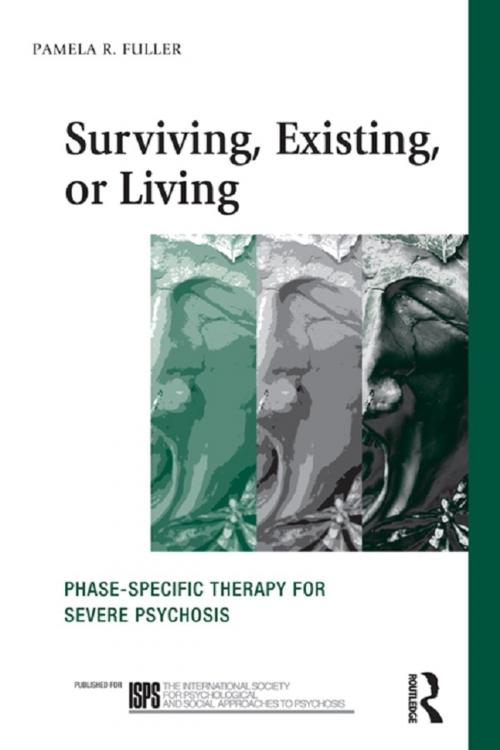Surviving, Existing, or Living
Phase-specific therapy for severe psychosis
Nonfiction, Health & Well Being, Psychology, Mental Illness, Medical, Specialties, Psychiatry, Clinical Psychology| Author: | Pamela R. Fuller | ISBN: | 9781135039707 |
| Publisher: | Taylor and Francis | Publication: | June 26, 2013 |
| Imprint: | Routledge | Language: | English |
| Author: | Pamela R. Fuller |
| ISBN: | 9781135039707 |
| Publisher: | Taylor and Francis |
| Publication: | June 26, 2013 |
| Imprint: | Routledge |
| Language: | English |
For professionals working with people who experience severe psychosis, increasing empirical evidence for the benefits of psychotherapy for psychosis has been especially welcome. Given the limitations of medication-only approaches and the need for an expanded perspective, including for those diagnosed with schizophrenia, Surviving, Existing, or Living takes a fresh look at severe psychosis, offering a heuristic model for understanding psychosis along a continuum of severity, from the extreme experience of acutely impairing psychosis to a more enriched life experience.
Pamela Fuller emphasizes that facilitating recovery from psychosis requires appropriately and effectively matching the type and timing of interventions to client readiness and capabilities. The need to consider each individual according to which of three primary issues/phases preoccupy the person with psychosis is essential for tailoring treatment. She identifies these phases as:
Surviving Phase – preoccupation with survival
Existing Phase – preoccupation with restriction of life experiences in order to cope
Living Phase – preoccupation with quality of life and relationships
Surviving, Existing, or Living examines the rationale for these three phases, and provides details of phase-specific treatment interventions as well as a 'how to' guide for facilitating engagement and for determining 'what to do when,' including with those experiencing acute, severe psychosis. Rich clinical case examples are provided to highlight concepts and the types of interventions. Trauma-specific and group interventions for psychosis are also described, as well as ways to foster resilience in the professional who works with individuals with psychosis.
Surviving, Existing, or Living offers a detailed guide to help individuals experiencing psychosis move from suffering to recovery, beyond surviving or existing toward more fully living. The book will be essential reading for professionals in the fields of psychology, psychiatry, counseling, medicine, social work, nursing, occupational, recreational, and vocational therapies, experience-based experts, and students.
For professionals working with people who experience severe psychosis, increasing empirical evidence for the benefits of psychotherapy for psychosis has been especially welcome. Given the limitations of medication-only approaches and the need for an expanded perspective, including for those diagnosed with schizophrenia, Surviving, Existing, or Living takes a fresh look at severe psychosis, offering a heuristic model for understanding psychosis along a continuum of severity, from the extreme experience of acutely impairing psychosis to a more enriched life experience.
Pamela Fuller emphasizes that facilitating recovery from psychosis requires appropriately and effectively matching the type and timing of interventions to client readiness and capabilities. The need to consider each individual according to which of three primary issues/phases preoccupy the person with psychosis is essential for tailoring treatment. She identifies these phases as:
Surviving Phase – preoccupation with survival
Existing Phase – preoccupation with restriction of life experiences in order to cope
Living Phase – preoccupation with quality of life and relationships
Surviving, Existing, or Living examines the rationale for these three phases, and provides details of phase-specific treatment interventions as well as a 'how to' guide for facilitating engagement and for determining 'what to do when,' including with those experiencing acute, severe psychosis. Rich clinical case examples are provided to highlight concepts and the types of interventions. Trauma-specific and group interventions for psychosis are also described, as well as ways to foster resilience in the professional who works with individuals with psychosis.
Surviving, Existing, or Living offers a detailed guide to help individuals experiencing psychosis move from suffering to recovery, beyond surviving or existing toward more fully living. The book will be essential reading for professionals in the fields of psychology, psychiatry, counseling, medicine, social work, nursing, occupational, recreational, and vocational therapies, experience-based experts, and students.















